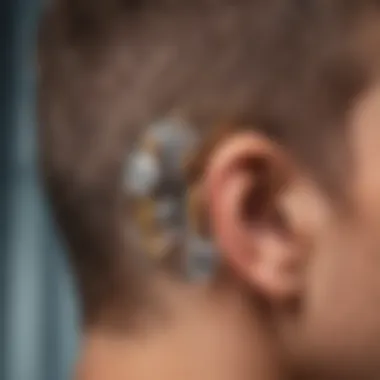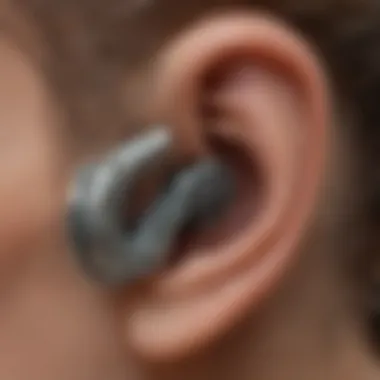Cochlear Implants and Their Impact on Tinnitus


Intro
Cochlear implants have emerged as a pivotal intervention for individuals grappling with profound hearing loss. But there's more to the story. Among the numerous challenges faced by these patients, tinnitus—perceived ringing, buzzing, or hissing in the ears—often complicates the auditory landscape. The relationship between cochlear implants and tinnitus is not merely a coincidence; it's a complex interweaving of technology and human experience that warrants extensive exploration.
Understanding how cochlear implants can influence tinnitus symptoms is essential for both clinical practitioners and researchers. This is especially true as we dissect the mechanisms involved and their implications for patient management. The nuances and controversies surrounding the efficacy and suitability of these devices make this a rich area for discussion and research.
Prelims to Cochlear Implants
Cochlear implants have emerged as a significant intervention for individuals grappling with severe hearing loss. This section delves into the fundamental aspects of cochlear implants, focusing on their definition, operation, and indications for use. Understanding these components is essential, not only for patients but also for researchers and healthcare professionals involved in the field.
Cochlear implants differ markedly from traditional hearing aids, offering a solution for those who may not benefit from amplification devices. They work by directly stimulating the auditory nerve, bypassing damaged parts of the ear. This capability is vital, especially in the context of individuals who experience both hearing loss and tinnitus—an auditory condition that leads to hearing sounds in the absence of external stimuli. Hence, a nuanced understanding of cochlear implants is fundamental to grasp the complexities surrounding their role in tinnitus management.
Definition and Purpose
A cochlear implant is an electronic medical device designed to provide a sense of sound to individuals who are profoundly deaf or severely hard of hearing. It consists of two primary components: an external portion worn behind the ear and an internal portion surgically implanted under the skin. The external part captures sounds and converts them into digital signals, which are then transmitted to the internal implant. There, the signals stimulate the auditory nerve directly.
The purpose of cochlear implants extends beyond mere auditory rehabilitation. They aim to restore the perception of sound in a way that enables users to engage in daily conversations, enjoy music, and perceive environmental sounds. Many patients report improved social interactions and quality of life post-implantation, highlighting both the functional and psychological benefits.
How Cochlear Implants Operate
Cochlear implants operate through a sophisticated mechanism that bypasses the damaged hair cells in the inner ear. When sound waves are captured by the microphone of the external processor, they are transformed into electrical signals. This digitized information is transmitted to the internal device, which directly stimulates the auditory nerve fibers through electrodes. This process recreates the auditory perception that the ear would naturally provide.
It's worth noting that the effectiveness of cochlear implants can vary depending on several factors, including the patient's age at the time of implantation, duration of hearing loss, and overall neurological health. Additionally, while they enhance sound perception, some users still experience residual tinnitus, necessitating further exploration into the connection between cochlear implants and tinnitus management.
Indications for Cochlear Implantation
Cochlear implantation is generally considered for individuals who meet specific criteria:
- Degree of Hearing Loss: Candidates typically have profound sensorineural hearing loss in both ears and receive minimal benefit from traditional hearing aids.
- Age: While infants as young as 12 months can be implanted, adults with recent severe hearing loss often qualify as well.
- Auditory Nerve Integrity: Functional auditory nerve pathways are crucial for the success of the procedure.
- Commitment to Rehabilitation: Potential users should demonstrate a willingness to participate in post-implantation therapy, which plays a critical role in adapting to the device.
Ultimately, understanding the intricacies of cochlear implants is not merely an academic exercise. It is a necessary exploration for clinicians, patients, and families considering the benefits and challenges of this remarkable technology.
"Cochlear implants have opened doors for many individuals, allowing them to step into a world of sound and communication once thought unattainable."
"Cochlear implants have opened doors for many individuals, allowing them to step into a world of sound and communication once thought unattainable."
Understanding Tinnitus
Understanding tinnitus is a crucial component of the broader discussion on cochlear implants. This condition can often be a raging storm within the mind, characterized by persistent ringing, hissing, or buzzing sounds that don't originate from an external source. It’s not merely an annoyance for many; it can profoundly shape one's day-to-day existence. In the context of cochlear implants, recognizing the nature of tinnitus is essential, as these implants could potentially modify its presence and impact.
What is Tinnitus?
Tinnitus is often described as a ‘phantom sound’ that varies in loudness and character from person to person. For some, it might sound like a distant waterfall, while for others, it can resemble a high-pitched whine. It’s important to recognize that tinnitus is not a disease in itself but a symptom often linked to various underlying issues, such as age-related hearing loss, ear injury, or even exposure to loud noises.
This condition can manifest in several forms:
- Subjective Tinnitus: This is the most common type, where only the person experiencing it can hear the noise. It can stem from ear infections, wax buildup, or damage to the ear's auditory pathways.
- Objective Tinnitus: This is rare and can be heard by a doctor through specialized instruments. It often relates to vascular issues, muscle spasms, or other physical problems.
Types and Causes of Tinnitus
Tinnitus can arise from various conditions, each contributing uniquely to the overall experience. Some of the more common causes include:
- Hearing Loss: As people age, natural hearing loss can lead to tinnitus, often intensifying the sensation.
- Noise Exposure: Regular exposure to loud noises remains a top culprit. This could mean anything from construction work to rock concerts.
- Earwax Blockage: Accumulation of earwax can result in pressure changes, leading to tinnitus.
- Medications: Certain drugs, like high doses of aspirin or antibiotics, can cause or worsen tinnitus.


The nature of these triggers highlights the complexity of tinnitus, suggesting that treatments must be tailored to each patient. This is where the interaction with cochlear implants comes into play. By addressing some underlying causes of hearing loss, cochlear implants might alleviate some forms of tinnitus.
Impact of Tinnitus on Quality of Life
The presence of tinnitus can dramatically alter an individual’s quality of life, inducing a mix of emotional and psychological challenges. Many who suffer from chronic tinnitus often report:
- Sleep Disturbances: The incessant noise can make it hard to fall asleep or stay asleep, leading to fatigue and decreased focus during the day.
- Anxiety and Depression: The lack of control over sounds that intrude upon daily activities can foster feelings of helplessness, ultimately spiraling into broader mental health issues.
- Social Isolation: People with pronounced tinnitus may shy away from social situations, fearing ridicule or misunderstanding, thus leading to solitude.
"Tinnitus isn’t just a sound; it’s an experience that shapes lives, often leaving people feeling unheard."
"Tinnitus isn’t just a sound; it’s an experience that shapes lives, often leaving people feeling unheard."
Understanding the multifaceted nature of tinnitus is crucial for any discussion surrounding cochlear implants. As we dive deeper into how cochlear implants relate to tinnitus, it becomes clear that managing expectations and outcomes for patient care is critical. The blend of medical and psychological approaches could be the key to improving life quality for those affected by this pervasive condition.
The Relationship Between Cochlear Implants and Tinnitus
Understanding the relationship between cochlear implants and tinnitus is crucial, as it can shed light on how auditory interventions impact the experience of persistent sounds. Cochlear implants are designed primarily to enhance hearing for individuals with significant hearing loss, yet their influence may also extend into the realm of tinnitus management. The link between these implants and tinnitus can offer hope and motivation for those suffering from this debilitating condition, while revealing complexities that call for careful consideration.
A few key elements underscore the significance of this relationship:
- Assessment of Treatment: Clinicians need to determine how effective cochlear implants can be for tinnitus sufferers. With a significant percentage of individuals experiencing tinnitus alongside hearing loss, it’s vital to discuss upfront how cochlear implantation might alleviate or exacerbate symptoms.
- Patient Benefits: For many, receiving a cochlear implant may not just restore the ability to hear; it may lead to a reduction in the perception of tinnitus. This effect can significantly improve quality of life, making the importance of understanding this dynamic even clearer.
- Individual Variability: Each patient’s experience with cochlear implants and tinnitus is unique. Factors such as the severity of tinnitus, duration, and individual responsiveness to implants all can make a marked difference in outcomes.
"Chronic tinnitus has a way of draining vitality; the intersection with cochlear implantation symbolizes a flicker of potential improvement for many."
"Chronic tinnitus has a way of draining vitality; the intersection with cochlear implantation symbolizes a flicker of potential improvement for many."
Ultimately, evaluating this relationship opens doors to new perspectives in both audiology and tinnitus management, paving the way for advanced research and novel treatment protocols. The following sections will provide further detail into how cochlear implants serve as a treatment for tinnitus, the mechanisms that underpin their effect, and the variability in outcomes experienced by patients post-implantation.
Cochlear Implants as a Treatment for Tinnitus
Cochlear implants are not primarily designed for tinnitus treatment; however, many individuals report decreased tinnitus severity after implantation. The underlying principle is that once hearing is restored, the brain’s interpretation of auditory signals may improve, potentially diminishing the presence of phantom sounds associated with tinnitus.
Benefits Observed:
- Improved Sound Perception: Restored hearing can help a patient distinguish between background noise and tinnitus.
- Neurological Adaptation: Some research suggests that after cochlear implantation, auditory pathways may rewire, leading to reduced awareness of tinnitus.
Current Observations:
Patients often have varying experiences with tinnitus post-implant. While some report significant relief, others find little to no change. This highlights the need for individualized patient assessments and management strategies.
Mechanisms of Action: How Cochlear Implants Affect Tinnitus
The reasons cochlear implants can impact tinnitus may be multifactorial. When individuals lose hearing, they may also lose certain sound frequencies which the brain attempts to fill with internal noise, resulting in tinnitus. Cochlear implants are thought to address this imbalance through several mechanisms:
- Restoration of Auditory Input: By providing auditory signals directly to the auditory nerve, the implant may help to normalize auditory processing in the brain.
- Reduction in Neural Hyperactivity: For some patients, the presence of tinnitus correlates with hyperactivity in certain neural pathways. The auditory input provided by the implant might reduce this activity, thus diminishing the manifestation of tinnitus.
- Masking Effect: New sounds can obscure or mask the perception of tinnitus, making it less bothersome for the patient.
Variability in Tinnitus Outcomes Post-Implantation
Outcomes post-cochlear implantation are not uniform among patients. Factors influencing this variability include:
- Tinnitus Duration: Longer-standing tinnitus may respond differently compared to recent-onset cases.
- Hearing Loss Severity: The degree of prior hearing loss before getting the implant often plays a role in how effective the implant is in reducing tinnitus.
- Patient Mental Health: Tinnitus’s psychological impact can vary significantly from person to person, affecting how one perceives the implant’s effectiveness.
Clinical Evidence and Research Findings
Examining the clinical evidence surrounding cochlear implants and their effect on tinnitus is essential for understanding the complexities of auditory disorders. This area of study provides insights not only into the efficacy of these implants in alleviating tinnitus symptoms but also sheds light on the mechanisms behind their functioning. With a backdrop of ongoing research, it's clear that mounting a robust understanding of clinical evidence can influence clinical practices, shape patient expectations, and ultimately guide healthcare decision-making.


Meta-Analyses on Cochlear Implants and Tinnitus
Meta-analyses serve as powerful tools in evaluating the landscape of existing research. They synthesize data from multiple studies to identify trends and derive more generalized conclusions regarding the effectiveness of cochlear implants in the context of tinnitus. Importantly, these analyses highlight variability in outcomes, suggesting that while some patients experience significant relief from their tinnitus after implantation, others may find little to no change.
Multiple meta-analyses have suggested the following key points:
- Overall efficacy: When reviewed collectively, most studies indicate a tangible benefit for tinnitus patients receiving cochlear implants.
- Variability: A considerable number of individuals report varying degrees of efficacy, making it crucial to tailor patient expectations prior to surgery.
- Psychological impact: Beyond the physiological changes, mental health factors significantly contribute to the experiences of individuals post-implant.
Understanding these findings allows clinicians to provide a more nuanced approach in counseling patients about what to expect.
Longitudinal Studies
Longitudinal studies, which track participants over time, are integral to understanding long-term outcomes for tinnitus patients after receiving cochlear implants. These studies often reveal a more comprehensive picture of how tinnitus symptoms may evolve with time and how patients adapt post-implantation. A few notable trends from recent longitudinal studies include:
- Time-dependent changes: Many patients report an initial fluctuation in tinnitus severity shortly after surgery, followed by a stabilization or reduction in symptoms over time.
- Predictor factors: Factors such as age, duration of tinnitus, and pre-existing hearing impairments appear to play significant roles in determining the extent of improvement.
- Correlational insights: Studies have drawn correlations between the quality of sound perception and the subjective experience of tinnitus, providing grounds for further inquiry regarding optimal implant settings.
Longitudinal studies underline the importance of ongoing support and assessment for patients, ensuring that adjustments can be made in a timely manner.
Patient Case Studies
Patient case studies provide qualitative insight that underpins the clinical evidence, revealing personal stories that statistics often gloss over. Through a narrative lens, these accounts shed light on individual responses to cochlear implants, allowing for a deeper understanding of the human experience associated with tinnitus management. Here, some significant takeaways from various case studies emerge:
- Diverse experiences: Each individual's context greatly influences their response to cochlear implants, demonstrating that the effects of the device can vary widely.
- Emotional dimensions: Many patients detail not just auditory changes but also emotional shifts, such as increased confidence or worsened anxiety surrounding their hearing.
- Personalized care: These stories emphasize the necessity of personalized care strategies that cater to unique patient backgrounds, highlighting the need for clinicians to listen actively and respond to patient concerns.
Case studies serve as vital illustrative anecdotes that complement quantitative data, serving as powerful motivators for continued enhancement in treatment protocols.
"Understanding the intersection of clinical research and patient experience is integral in advancing cochlear implant efficacy for tinnitus management."
"Understanding the intersection of clinical research and patient experience is integral in advancing cochlear implant efficacy for tinnitus management."
In summary, each layer of clinical evidence contributes to a greater understanding of the connections between cochlear implants and tinnitus. By exploring meta-analyses, longitudinal studies, and patient narratives, healthcare providers can craft more informed, compassionate treatment pathways that ultimately enhance the quality of life for those affected by auditory disorders.
Considerations for Patients with Tinnitus Seeking Cochlear Implants
Navigating the waters of cochlear implantation when tinnitus is also in the mix can be quite the challenge. For individuals afflicted with this complex interplay of conditions, it’s crucial to unpack several layers of consideration before deciding on surgery. A successful cochlear implant procedure may not only improve hearing loss but might also provide unpredictable outcomes relating to tinnitus, making informed decision-making all the more essential.
Pre-Implant Assessment
Before making the leap into cochlear implantation, patients undergo a pre-implant assessment. This stage is like a dress rehearsal; every actor—doctor, patient, audiologist—plays a vital role. The assessment usually involves a thorough evaluation of hearing capabilities, health history, and personal experiences with tinnitus. A typical pre-implant assessment might include:
- Comprehensive Audiological Assessment: This helps determine the degree of hearing loss and any residual hearing that might be beneficial post-implantation.
- Tinnitus Questionnaires: Standardized forms that help document the extent and severity of tinnitus, aiding in assessing how it impacts daily life.
- Medical Evaluation: A complete health review ensures no underlying conditions could complicate surgery.
This phase is indispensable as it sets the groundwork for what to expect after the surgery. Gathering all this data provides both patients and healthcare providers with a clearer picture of potential success and hurdles.
Post-Implantation Management of Tinnitus
Once the device is in place and activated, the management phase begins. Patients often find themselves in uncharted waters; while many report improvements in hearing, tinnitus reactions can vary widely. Understanding that post-implantation management is ongoing is key.
Some patients experience a shift in their tinnitus perception; in some cases, it may enhance, while in others, it might diminish significantly.
Management strategies could include:
- Counseling Therapies: Techniques such as cognitive behavioral therapy that help patients cope with the emotional aspects of tinnitus.
- Sound Therapy: Utilizing various sounds to mask tinnitus can provide significant relief.
- Regular Follow-up Appointments: Routine check-ups allow for adjustments in program settings and the opportunity for patients to share their experiences and concerns.


Navigating this phase calls for patience and adaptability, underscoring the importance of having a supportive healthcare team.
Guidelines for Counseling Patients
Counseling plays a fundamental role in preparing patients for what lies ahead. Effective communication starts with educating patients on what to expect during and after the cochlear implantation process. Setting realistic expectations is paramount. Here are some guidelines for counseling:
- Share Evidence-Based Information: Help patients understand the dual aspect of cochlear implants and tinnitus, backed by real data.
- Discuss Potential Outcomes: Be forthright about the varied responses to implantation, emphasizing that individual experiences may diverge distinctly from clinical expectations.
- Encourage Open Dialogue: Urge patients to express their worries or misconceptions about the process, building trust and rapport.
- Highlight Support Structures: Provide information on support groups or counseling services where they can connect with others facing similar challenges.
These strategies aim to empower patients, easing their journey through an often complicated decision-making mosaic and, ultimately, enhancing their quality of life post-implantation.
Innovations and Future Directions
In the realm of auditory health, the exploration of cochlear implants and their interplay with tinnitus marks a significant journey. This section delves into the cutting-edge advancements and future possibilities shaping the management of tinnitus through cochlear implant technology. Here, we illuminate the potential impacts of these innovations, consider their efficacy, and discuss the interdisciplinary approaches proposed to enhance treatment outcomes.
Advances in Cochlear Implant Technology
Technology in the field of cochlear implants has come a long way since their inception. The latest models boast refined sound processing algorithms that prioritize clarity and intelligibility. For instance, devices like the Cochlear Nucleus 8 employ sophisticated machine learning to adapt to various acoustic environments dynamically, making it easier for users to distinguish speech in noisy settings. Such advancements have led to significant improvements in how patients with tinnitus experience sound.
Moreover, researchers are exploring biocompatible materials that can potentially reduce the risk of rejection and complications post-implantation. Through these innovations, we can hope to see an increase in the number of successful implantations and improved patient satisfaction.
Emerging Therapies for Tinnitus Management
Beyond just cochlear systems, the landscape of therapies for tinnitus management is evolving. Current trends highlight a shift toward integrative care. Audiologists and healthcare providers are investigating therapies that complement cochlear implants.
One promising approach is neuromodulation, which aims to alter nerve activity through targeted stimulation. Techniques such as transcranial magnetic stimulation (TMS) are being studied for their ability to alleviate tinnitus symptoms, potentially in conjunction with cochlear implants.
Other therapies include:
- Sound therapy: Utilizing customized sounds or white noise to mask tinnitus perception.
- Cognitive Behavioral Therapy (CBT): Helping patients adjust their response to tinnitus, reducing its perceived impact on their lives.
By combining these strategies with cochlear implantation, clinicians can offer a more holistic management plan for tinnitus sufferers.
Interdisciplinary Approaches in Treatment
The complexity of tinnitus can call for an array of treatment modalities, warranting an interdisciplinary approach. The collaboration between audiologists, psychologists, otolaryngologists, and even neurologists becomes crucial in designing comprehensive management plans.
For example, when a patient presents with both hearing loss and distressing tinnitus, a joint effort might involve an audiologist fitting a cochlear implant while a psychologist conducts therapy sessions aimed at re-framing the patient's perception of their tinnitus.
Such collaborative approaches not only enhance the quality of outcomes but also provide patients with multifaceted support tailored to their specific needs. This helps in addressing the psychological components that often accompany tinnitus, fostering a more robust recovery pathway.
"Interdisciplinary treatment plans offer a robust framework to not only address the symptoms of tinnitus but also the emotional and psychological challenges that often shadow this condition."
"Interdisciplinary treatment plans offer a robust framework to not only address the symptoms of tinnitus but also the emotional and psychological challenges that often shadow this condition."
The End
The conclusion serves as a crucial wrap-up of the exploration into cochlear implants and their relationship with tinnitus. It synthesizes the insights shared throughout the article and emphasizes the significance of understanding this connection for both patients and healthcare providers. The objective is not merely to provide information, but to highlight the potential benefits and considerations surrounding cochlear implants as an option for tinnitus management.
Summary of Key Insights
In our journey through this topic, several key points emerged:
- Cochlear Implants' Functionality: These devices do not just restore hearing capabilities; they have shown potential to alleviate tinnitus symptoms in some patients. The way they bypass damaged cochlear structures can lead to alterations in the auditory processing pathways, which can help mitigate the perception of tinnitus.
- Variability in Responses: Not all patients respond identically to cochlear implants regarding their tinnitus symptoms. Factors like the duration of hearing loss, the characteristics of the tinnitus, and individual brain processing can substantially influence outcomes.
- Research Importance: The clinical findings we reviewed highlight the necessity of continued studies into how cochlear implants might serve as both a hearing restoration tool and a tinnitus management strategy. Evidence suggests that while some experience relief, others may not see significant changes, underscoring the importance of personalized care.
Call for Further Research
The interplay between cochlear implants and tinnitus presents abundant opportunities for further exploration. Future research should focus on:
- Longitudinal Studies: More comprehensive long-term studies could provide deeper insight into how cochlear implants impact tinnitus over years post-implantation, considering different demographic and medical backgrounds.
- Mechanisms of Effect: Understanding the underlying mechanisms by which cochlear implants may reduce tinnitus symptoms is crucial. This knowledge can inform improved patient selection criteria and potentially lead to innovations in cochlear implant technology itself.
- Interdisciplinary Approaches: Collaborations among audiologists, neurologists, and psychologists may uncover new treatment methodologies or combined therapies that can be more effective than current standard practices.
In essence, the relationship between cochlear implants and tinnitus is a compelling field ripe for inquiry. Addressing the knowledge gaps can refine eligibility assessments, optimize patient care, and enhance outcomes for individuals grappling with both hearing loss and tinnitus.



